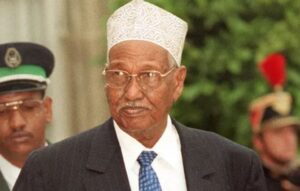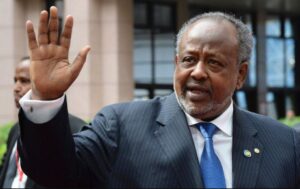Since its independence in 1977, Djibouti has had a relatively stable political environment with only a few presidents serving the country. Here is a detailed list of the Presidents of Djibouti, arranged in order:
READ ALSO: List of Prime Ministers Who Have Ruled Eswatini Till Date
| No. | President | Tenure |
|---|---|---|
| 1 | Hassan Gouled Aptidon | 1977 - 1999 |
| 2 | Ismaïl Omar Guelleh | 1999 - Present |
Hassan Gouled Aptidon – The First President of Djibouti

Hassan Gouled Aptidon was born in 1916 in Lughaya, in the Obock region, then part of French Somaliland. He belonged to the Issa clan, which is part of the larger Somali ethnic group.
Before becoming the president, Aptidon was a prominent figure in Djibouti’s struggle for independence from France. He served as the Vice President of the Government Council of French Somaliland and was a member of the French National Assembly.
Notable Achievements:
- Independence Leader: Aptidon is widely recognized as the father of Djibouti’s independence. He played a crucial role in negotiating the country’s independence from France in 1977.
- Nation-Building: As the first president, he laid the foundations of the newly independent state, focusing on national unity and economic stability.
- Constitutional Reforms: Under his leadership, Djibouti adopted its first constitution, which established a presidential system of government.
Downsides:
- Authoritarian Rule: Aptidon’s presidency was marked by a lack of political pluralism. His party, the People’s Rally for Progress (RPP), dominated the political landscape, leading to accusations of authoritarianism.
- Economic Challenges: Despite his efforts, Djibouti faced significant economic challenges during his tenure, including high unemployment and reliance on foreign aid.
READ ALSO: Presidents That Have Ruled Lesotho Till Date
Ismaïl Omar Guelleh – The Current President of Djibouti

Ismaïl Omar Guelleh was born on November 27, 1947, in Dire Dawa, Ethiopia, but his family is from the Issa clan in Djibouti.
Before becoming president, Guelleh served as the head of the secret police and as the Chief of Staff to his uncle, President Hassan Gouled Aptidon. He was also a prominent member of the ruling RPP party.
Notable Achievements:
- Economic Development: Guelleh has focused on developing Djibouti’s economy, particularly through infrastructure projects such as the expansion of the port of Djibouti and the construction of the Djibouti-Addis Ababa railway.
- Strategic Alliances: Guelleh has strengthened Djibouti’s strategic importance by hosting military bases for several countries, including the United States, France, and China. This has brought in significant revenue and bolstered the country’s security.
- Political Stability: Despite regional instability, Guelleh has maintained a relatively stable political environment in Djibouti.
Downsides:
- Extended Tenure: Guelleh’s long tenure has raised concerns about democratic practices in Djibouti. He has been criticized for amending the constitution to remove term limits, effectively allowing him to stay in power indefinitely.
- Human Rights Issues: His government has faced criticism for human rights abuses, including the suppression of political opposition, media censorship, and the use of force against protesters.
READ ALSO: Presidents That Have Ruled Liberia Till Date
Current Vice President of Djibouti
Djibouti does not have a designated vice president. The country’s political system does not include the position of vice president; instead, power is centralized in the hands of the president. The president appoints a prime minister and other key officials who assist in governing the country.
Conclusion
Djibouti’s political history is marked by the long tenure of its presidents, with only two individuals holding the office since the country’s independence.
While both presidents have made significant contributions to the nation’s development, their leadership has also been marked by challenges, particularly regarding democratic governance and human rights.
Despite these issues, Djibouti remains a strategically important nation in the Horn of Africa, with a stable political environment that has allowed it to navigate the complexities of regional and international politics.
